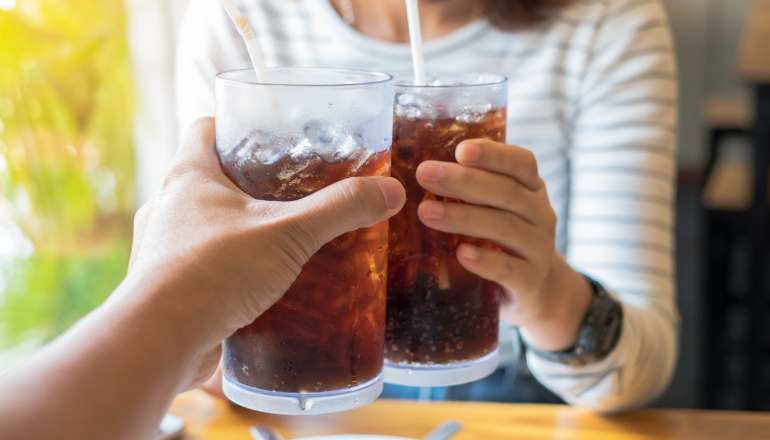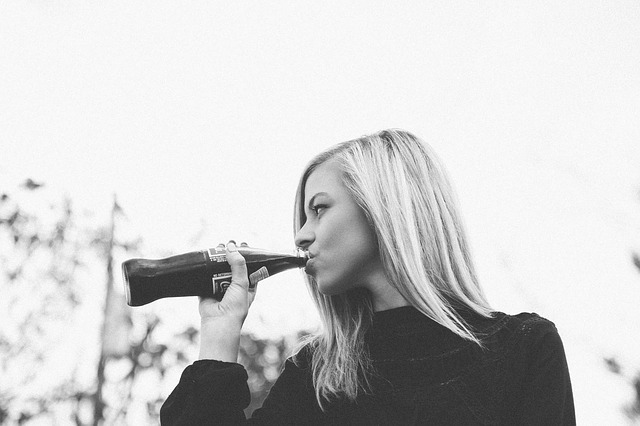
Shortly after my divorce, I took a year off from drinking alcohol. Though it had never been a problem in my life, it occurred to me that during the aftermath of a trauma like a divorce, having a few alcoholic drinks to dull the pain might actually delay or worsen it instead.
It was the right decision for me at that time and since I had never been a big drinker, abstaining from alcohol wasn’t an ordeal. Still, while out socializing with friends or after a long day of work, I yearned for something bubbly and tasty to drink. A bottle of water just didn’t do the trick.
But ironically, in giving up booze, I picked up an arguably worse habit — diet soda.
The Problem with “Moderation”
Though I wasn’t a big soda drinker, something gnawed at me whenever I picked up a can. Despite the refreshing taste, I couldn’t help but wonder if I was ingesting a bit of poison with each sip.
As the months passed, I enjoyed a couple of pops a day, but the more I looked at the evidence, the more I knew my fate with soda was sealed. Eventually, I made the choice to permanently stop drinking soda and opted instead for the occasional glass of sparkling water, beer, wine, or juice.

There’s something many of us say when we’re enjoying a guilty pleasure. “Everything in moderation,” we say as we snarf down a cheeseburger or inhale a pint of ice cream. To many of us, life without the simple satisfaction of an occasional sweet delicacy, fine-dining experience, or a great breakfast at a greasy spoon doesn’t seem like a life worth living.
To be sure, there does seem to be some logic in allowing yourself the “finer” things in life once in a while:
- I’ve seen countless people try to completely cut out things like sweets on crash diets. The zero-sum approach might initially help you lose weight, but the story always ends the same — cravings and pleasure win out over short-term willpower every time.
- You can also make the argument when it comes to alcohol, red meat, or desserts that there are at least some nutritional and/or health benefits to consuming each in moderation. Several studies even corroborate the cardiovascular health benefits of occasional alcohol consumption.
But there are no legitimate peer-reviewed studies that conclude soda consumption is any way good for you. Conversely, I would argue that drinking soda is like smoking cigarettes (minus the harmful effects to others from second-hand smoke). Soda may taste good, but the habit is unquestionably hazardous to your health.
“Everything in moderation” should be rephrased to say, “Some things in moderation.” After all, we used to say the same thing about cigarettes in the 1950s and opioids in the 1920s. People used to think, “What’s the harm in relaxing with the occasional cigarette?”
It turns out, plenty.

Science has conclusively shown that any amount of a substance like a cigarette is a toxin and can only do harm. Furthermore, the problem with highly addictive substances is that you don’t have just one. They don’t tell you at addiction treatment that everything is okay in moderation. Heroin is not okay in moderation.
Despite the Marlboro Man telling us for years that smoking is relaxing, sexy, and cool, we now know these substances can kill you even in moderation. Thankfully, people have finally gotten the real message about disease, death, and cigarettes. Smoking in the United States is now at an all-time low with only 14% of adults partaking.
But now, instead of Joe Camel implying that smoking is cool, Lebron James reminds us that Sprite has “big taste.”
Science Tells Us Why We Should Stop Drinking Soda
Savvy marketing doesn’t give us an excuse to drink a harmful substance regardless of how good it tastes. We must ask ourselves what the difference is in Coke reminding us to “open happiness” and Marlboro telling us to “come to where the flavor is.”
As a society, we cannot ignore the overwhelming scientific fact that soda is harmful and provides no potential health benefit. Consider the following:
- A study led by Tufts University concluded an estimated 184,000 deaths worldwide are attributed to consumption of sugar-sweetened beverages.
- Studies that have been led by independent researchers show a clear link between soda consumption and obesity or metabolic disease.
- A 20-year study on 120,000 men and women found people who increased their sugary drink consumption by one 12-ounce serving per day gained significantly more weight over time.
And drinking diet soda won’t help you. It’s not just sugar that is responsible for the weight gain and health risks like metabolic syndrome. Artificially sweetened diet soft drinks are culprits, too:
- A study conducted by endocrinologist, Sabyasachi Sen M.D. found that low-calorie sweeteners may predispose overweight individuals to diabetes. With sweeteners being some 600 times sweeter than sugar, your brain is tricked into thinking you’re drinking sugar. Says Dr. Sen, “The downstream effect is almost the same as sugar. Which is essentially fat accumulation and fat gain.”
- Studies also show artificially sweetened beverages may lead to increased risk of stroke and dementia.
- Not only are sugar-sweetened beverages conclusively bad for your health, studies show sugar can also be as addictive as drugs like cocaine.
Yet, regardless of the conclusive cautionary evidence, many of us cannot imagine enjoying a burger and fries without a soda or popcorn at the movies without a giant pop. Marketing is still winning the war where it comes to soda.
To be fair, there is harmful sugar added to many of the foods and drinks we consume, not just soda. We should be scrutinizing all our foods and beverages.
But even most packaged foods have at least some nutritional value. Pop does not.
The Choice Will Be Hard (But You Can Do It)
There is a caveat where it comes to soda consumption (or tobacco and drug use, for that matter). You aren’t a “bad” person for drinking soda and I am not a “better” person than you for not drinking pop.
We all have our vices and this narrative isn’t meant to damn drinkers of soda any more than we should shame those who fall victim to smoking or drugs. Ultimately though, using substances that are toxic to us is a choice. If we make the choice to smoke, we also must face the daunting prospects of lung cancer or emphysema. A similar logic applies to soda.

Achieving optimal health and navigating the landscape of modern nutrition can be overwhelming. It’s likely true that you cannot simply abstain from sugar for the rest of your life. Sugar is everywhere and in almost everything we eat – of the more than 600,000 foods in the American food industry, over 80% of them contain added sugars. Even many fruits and vegetables, considered healthy and nutritious by most, can be high in natural sugar (fructose).
But you can stop drinking soda forever just like you can quit alcohol, cigarettes, or opioids.
Not to downplay how difficult such a change can be, but the rewards of a dependency free, naturally healthy lifestyle are widely touted and hard to underestimate. But, to successfully stop drinking soda, you’ll need to open yourself to the freedom of other possibilities.
After all, our sense of taste is subjective, and we all possess the ability to change our preferences. You can learn to love strawberries as much as candy. You can learn to love cucumber-infused water as much as Pepsi. You simply don’t have to be a slave to soda.
Will You Stop Drinking Soda?
I’m the first to admit soft drinks are pretty tasty. I have fond memories of enjoying “classic” Coke as a kid with my uncle who was a cola addict. “Coke tastes good,” my uncle would state simply, and it did. My uncle ended up dying at age sixty of complications from diabetes.
Frankly, there’s no justifiable reason to drink soda other than you are an adult who has made an informed choice to do something you enjoy despite the potential detrimental effects.
To me, soda just isn’t worth it. And the more I look at the literature, the more damning the evidence appears. There is plenty of downside and zero nutritional value in a can of soda — diet, regular, or otherwise.
The bottom line is it’s time to put the soda down.



































